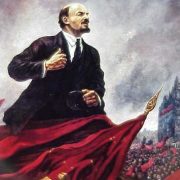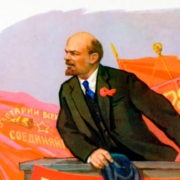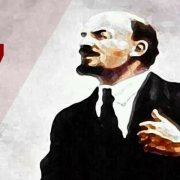LENIN AT 150: LENIN LIVES!
2. The importance of revolutionary theory in the revolutionary movement
Lenin declared that without revolutionary theory there can be no revolutionary movement. Marx and Engels formulated the fundamental principles to lay down the foundation of Marxism and the world proletarian revolution. Thus, the Bolsheviks adhered to Marxism. But to make the proletarian revolution even more effective in his own time and for posterity, Lenin further developed Marxism and made his own theoretical contributions in philosophy, political economy and social science.
He wrote Materialism and Empirio-Criticism in 1909 to further explain dialectical materialism and contend with subjectivist idealism that is systematically narrowed down and limited to the empirical basis required by science and is presented as the third-party philosophy between materialism and idealism. The philosophical work is important because it debunks the bourgeois subjectivists who invoke empiricism and science to obscure the objective reality and inner contradictions of problematic social phenomena to be solved and deny the conscious capability of the people to solve the problems and change the status quo.
Lenin advanced our understanding of dialectical materialism by identifying the unity of opposites as the most fundamental among the laws of contradiction at work in society and nature and in the social and natural sciences. The simple expression of this is to divide one into two. One should not be dumbfounded by anything whole that is impressive or sacralized. Anything whole in the real world can be dissected, analyzed and critiqued. At the same time, anything that appears static, or anything that apparently emerges randomly from chaos, can be deeply understood in the movement of opposites that lurk within it. With his consciousness of the unity of opposites, Lenin was sharp and profound in his examination and analysis of events and issues in society and on both revolutionary and counterrevolution sides.
Consequent to reading and studying Das Kapital, he proceeded to study the Russian economy and wrote the Development of Capitalism in Russia in 1899. He recognized the character of Russia as a military-feudal type of imperialism, with a rising bourgeoisie establishing industrial enclaves and impacting on the rural communes. And he identified the industrial proletariat as the most progressive productive force capable of winning political power with the support of the peasant masses and leading the people to socialism.
He had a comprehensive grasp of the bourgeois democratic and socialist stages of the Russian revolution and the principles of socialist revolution and construction against the capitalist system. He always spelled out socialism as the ultimate goal at every point in the revolutionary advance of the Bolsheviks and the proletariat. It was the objective of achieving socialism that motivated the Bolsheviks to oppose and overthrow the bourgeois Provisional Government of Kerensky and his allies.
Even as he was preoccupied with the demands of leading the Bolsheviks under conditions of imperialist war, he was able to write Imperialism, the Highest Stage of Capitalism in 1916 and publish it in 1917. He explained the plundering, aggressive, decadent and moribund character of monopoly finance capitalism and the struggle for a redivision of the world among the imperialist powers. He also pointed out that the socialist parties of the Second International turned social chauvinists in support of the war policy of their respective imperialist countries because said parties represented the labor aristocracy serving as the tail of the big bourgeoisie.
Despite having to lead the Bolsheviks in the intensifying struggle for political power and despite the threats to his life and liberty, Lenin was able to write State and Revolution in 1917. It was a timely work to explain the class character of the state and revolution and inspire and guide the Bolsheviks and the proletariat in intensifying the class struggle for socialism against the Kerensky government. It was a master work for future generations to learn that the essence of revolutionary struggle of the proletariat is to seize political power and build socialism.
After seizure of political power by the Bolsheviks, Lenin had to confront the inadequacies and difficulties in maintaining “war communism” which involved requisitioning food from the peasants and rationing under war conditions. He had to adopt the New Economic Policy as an expedient measure to respond to the peasant demand for compensation and give concessions even to the rich peasants, the traders and entrepreneurs in order to revive the economy ruined by the inter-imperialist war and the counterrevolutionary war. He adopted such a policy to save the rule of the Bolsheviks and the proletariat, stay on the road to socialism and prepare for advance.
Lenin had an unquenchable thirst to further his theoretical and practical understanding of the proletarian revolution and various contradictions in society, and led the Bolsheviks in raising the party’s capacity to combine theory and practice. The sheer volume and scale of his lifelong contributions are reflected in his prolific output of books, pamphlets, articles, party and state documents drafted by him, unpublished manuscripts, extensive commentaries and marginal notes on works by other authors, including statistical yearbooks and other informative materials. Much of his teachings and insights remain resonant and enlightening to current-day revolutionaries.
Our appreciation of Lenin’s contributions include his principled personal conduct, comradely mien, simple lifestyle, and strict work regimen, which are not as easily measured as his written works and official acts as leader of the Bolshevik party and Soviet state but have been unassailable facts in his many biographies, except the worst anti-communist ones. These are integral to his teachings and have inspired the respect and admiration of succeeding generations of revolutionaries.
To be able to lead the socialist revolution and construction effectively, Stalin learned from Lenin the principles and general methods of carrying them out. Lenin always explained in the context of preserving and strengthening the revolutionary forces and preparing the way for a further advance whenever there was the need to adopt a certain policy or course of action that involved a retreat or appeared to delay the advance of socialism.
He had the foresight to found the Third or Communist International against the social-chauvinist Socialist International as early as 1919. It was a necessary step to amplify the victory of the October Revolution, reject the revisionist line of the Second International, encourage the revolutionary movement under the spirit of proletarian internationalism and widen the latitude for the consolidation of Soviet power. But he also had diplomatic flexibility in approving the Brest-Litovsk Treaty to consolidate power and neutralize further attacks by the imperialist powers.
He exercised profound theoretical leadership in founding and steering the Soviet state through its early years of development, as well as engaging in its most critical tasks and practical policy questions, until his work was cut short by severe illness and death in 1924. The same was true in his exercise of leadership within the Third International.
Relative to the current wave of mass protests against imperialism and reaction on a global scale, we must learn from the history of the Bolsheviks that they could win victory because of the theoretical and practical leadership of Lenin. He applied his own dictum that the revolutionary mass movement can become strong and advance further if there is a revolutionary theory that can guide the masses and there is the revolutionary party of the proletariat that upholds and applies such theory to the revolutionary struggle against the counterrevolutionary state of the bourgeoisie.






Leave a Reply
Want to join the discussion?Feel free to contribute!